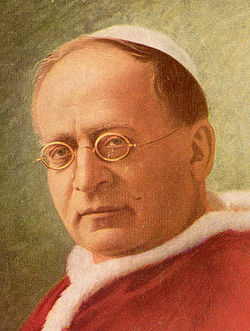
|
|
|
|
|
|
|
|
|
|
|
|
|
|
|
|
|
|
|
|
|
|
|
|
|
|
|
|
|
|
|
|
|
|
|
|
|
|
|
|
Pope Pius XI

Pope Pius XI (Latin: Pius PP. XI; Italian: Pio XI; May 31, 1857 – February 10, 1939), born Ambrogio Damiano Achille Ratti, reigned as Pope from February 6, 1922, and as sovereign of Vatican City from its creation as an independent state on February 11, 1929 until his death on February 10, 1939. He issued numerous encyclicals including Quadragesimo Anno highlighting capitalistic greed of international finance, social justice issues and Quas Primas establishing the feast of Christ the King. He took as his papal motto "Christ's peace in Christ's kingdom".
Achille Ratti underwent the most unusual papal career in the 20th century. Throughout his life he was an accomplished scholar, librarian but humble priest. He celebrated his 60th birthday as a priest on May 31, 1917 and fewer than five years later, on February 10, 1922, he was elected Pope, succeeding Pope Benedict XV, who was only thirty months older and thus from the same generation as Ratti. In those five years he had short stints as papal nuncio in Poland, which forced him to leave the country, and as Archbishop of Milan, where he served for a few months before being elected Pope. He chose the name Pius, and his personality was strong , similar to Pius IX and Pius X. But as a scholar, he was open to science and research like no other Pope since Leo XIII. To establish or maintain the position of the Church, he fostered and concluded a record number of concordats including the Reichskonkordat with Germany. Under his pontificate, the 1870 stalemate concerning the Roman Question with Italy over the status of the papacy was finally solved in the Lateran Treaty of 1929 with the assistance of Pietro Gasparri and Francesco Pacelli, brother of the future Pope Pius XII. He was unable to stop the Terrible Triangle consisting of massive Church persecution and killing of clergy in Mexico, Spain and the Soviet Union. While in Mexico and Spain, the persecution was mainly directed against the Catholic Church, hostility in the Soviet Union were directed against all Christians but especially against the Eastern Catholic Churches united with the Vatican. He vehemently protested against both Communism and National Socialism as demeaning to human dignity and a violation of basic human rights, but found no echo or support in the democracies of the West, which he labeled a Conspiracy of Silence. Against totalitarian demands, he fostered the freedom of families to determine on their own the direction of education of their children.
In one of his most important encyclicals on the social order of modern society, Quadragesimo Anno he stated that social and economic issues are vital to the Church not from a technical point of view but in terms of moral and ethical issues involved. Ethical considerations include the nature of private property, in terms of its functions for society the development of the individual. He defined fair wages and branded the exploitation both materially and spiritually by international capitalism. He canonized important saints including Albertus Magnus, Thomas More, Petrus Canisius, Konrad von Parzham and Don Bosco. He beatified and canonized Thérèse de Lisieux, for whom he held special reverence. He created the feast Christ the King
Pius XI took strong interests in fostering the participation of lay people throughout the Church, especially in the Catholic Action movement. The end of his pontificate were dominated by defending the Church from intrusions into Catholic life and education.
Life Dates | Visitors |
Museum
| Special People |
Holy Mother Mary
St. Mary's Church |
Become a Volunteer | Buy a Book |
Museum Shop
How to Find Us | Our Future |
Our Beginnings | Photo Gallery
| Links | Personal Testimonies
Calendar of Events | Bishop Sheen Quotes |
Inspirational Messages |
Contact
Us | Home
